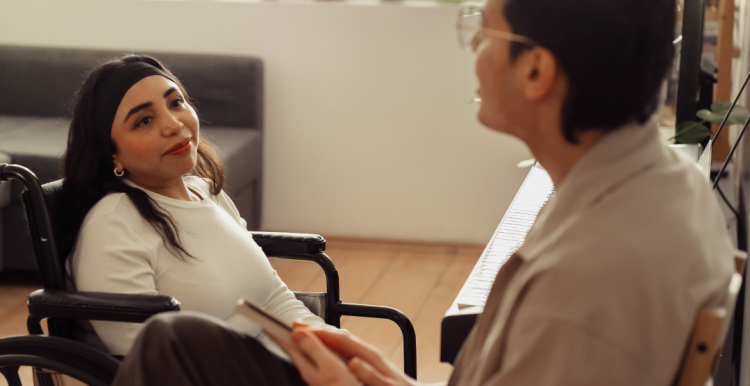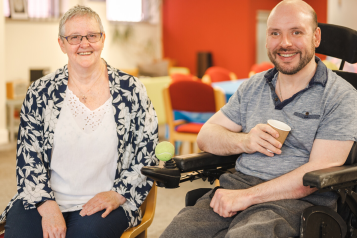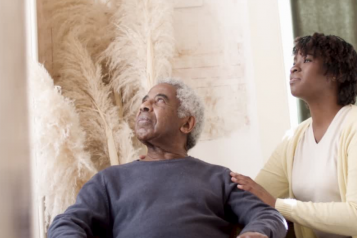Where to get information and support if you are a carer living in Medway

What is a carer?
Being a carer can be a professional career. People who work in some healthcare settings and people who work in social care settings like care homes or mental health support homes may be classed as professional Carers.
However, anyone can be a carer. As said on NHS commissioning, a carer is anyone, regardless of age, who looks after a family member, partner or friend because of illness, frailty, disability, mental health issues or addiction and cannot cope without the support.
This support can be unpaid and many people who care for a family member or partner may not see themselves as a carer. The duties that paid and unpaid carers may do vary widely and some are hidden, particularly among young carers.
The NHS is currently aiming to improve carers involvement in the healthcare of the person/persons they care for. This involves giving them rights to be informed of important developments.
Did you know?
Some facts about unpaid carers in the UK.
- The 2021 census found there are 5.8 million unpaid carers in the UK. 1.7 million of those are classed as providing care for more than 50 hours per week.
- Centre for care estimated 4.3 million people became unpaid carers every year.
- According to the census, 59% of unpaid carers are female.
- The biggest proportion of carers are in the 55 - 59 age group the census reveals.
- The biggest proportion of unpaid carers doing 50+ hours were women between the age of 75 and 79 and men between 85 and 89 years of age.
- Research done by Carers UK found 1.2 million living in poverty with 400k in deep poverty.
- Carers UK in 2024 found 61% are worried about the cost of living and managing in the future while 27% are struggling to make end meet and 28% cutting back on essentials like food and heating.
- The 2021 census found 1 in 4 carers reported not good health when fewer than 1 in 5 of the wider population reported so.
- The 2024 Gp Survey found 70% of carers have a long-term health condition or impediment.
- Public health England says caring should be a social determinant of health.
- Carers UK found 79% feel stressed or anxious and 49% feel depressed. 54% said their physical health suffered.
- 3 million are in employment my 2.7 million are not.
- Being out of work is the single strongest predictor of carer poverty.
- More likely to be working part time at 38% compared to 29% of wider population.
- 73% of carers in employment said they had found it stressful to combine working and care and 48% in employment said they had reduced their hours.
If you are a carer, paid or unpaid, where can you go for support?
You can get support for being a carer though your local GP, through social services or through any of the organisations on the list below.
If you have worked for the same employer for 26 weeks you can request flexible working, which may be useful for carers.
Carers UK is the main organisation in which people can go to for support.
tehy can help with energy snd bills and stguff
Turn 2 Us
Turn 2 Us can offer advice and support.
Citizen's advice can also provide support.
They also run activities such as care for a cuppa and carers connect.
The Carers trust
also provide help and support for carers in the United Kingdom. This includes a benefit calculator to help work out what benefits someone is entitled to, as well as advice on how to claim carers allowance.
And the National Carers service helpline for education and careers help.
Carers direct helpline - 0300 123 1053.
Support is provided by Age UK because of the gap in the availability of social care in the UK. It is a growing and concerning issue in the UK.
imago https://www.imago.community/carers-services/carer-support
Carers support in Medway.
They have a telephone hotline - 0300 303 155
Young carers
can also get help from school and college
as well as Childline.
They can be reached on 0800 11 11
The children society can also help
They also run the young carers festival.
Sense
runs online and in-person activities for young carers under 18.
The Mix
run weekly online support for young carers up to the age of 25.
Social workers can also help.
Needs Assessment
An assessment of needs can help someone get carers allowance.
Kent County Council offers support in a variety of ways. They offer eligibility tests for an assessment.
To get one.
Call 03000 41 61 61
Are you a carer? Are you getting the help and support available? | Healthwatch Medway
Carers First
https://www.carersfirst.org.uk/medway/how-we-help/
They run health and well-being sessions online and in community. Doing relaxation and fitness events, art and pottery also done.
A 4-week training programme called caring confidently is offered.
The 4 sessions are
- The caring role: an introduction to the support available from Carers First, carers rights, carers assessments and other help available locally
- Looking after you: taking care of your mental and physical health, building resilience, and finding time for yourself
- Finances and legal issues: an introduction to welfare benefits and grants for carers, as well as Wills and Power of Attorney
- Practical support: this final session will focus on either First Aid or manual handling
An online group help on Wednesdays for working careers is run. Different theme each Wednesday based on a different issue.
Money advice sessions are run for financial and legal help. These are done both online and, in the community,
Education, employment, and training sessions are done to help people get access. Some for young carers. Both online and in the community,
An Online moving on/staying together group is held. (MOST). This is online.
Workshops. Day trips sports and carer led meetings are held to connect people together. Most of these are in the community but some are online.
A virtual well-being programme is held online every first Tuesday 11-12.15.
They have also set up a Facebook group.


